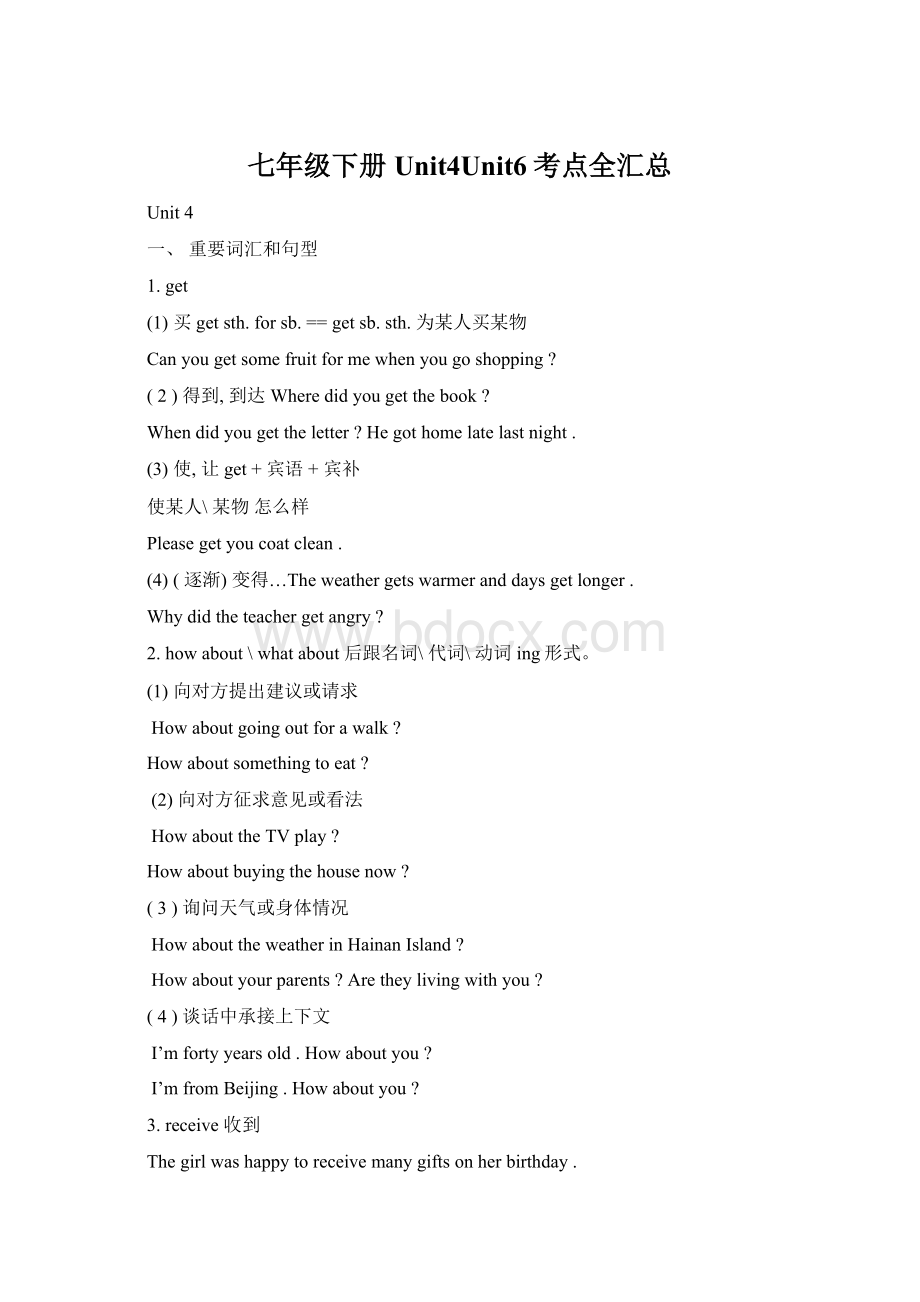七年级下册Unit4Unit6考点全汇总.docx
《七年级下册Unit4Unit6考点全汇总.docx》由会员分享,可在线阅读,更多相关《七年级下册Unit4Unit6考点全汇总.docx(18页珍藏版)》请在冰豆网上搜索。

七年级下册Unit4Unit6考点全汇总
Unit4
一、重要词汇和句型
1.get
(1)买getsth.forsb.==getsb.sth.为某人买某物
Canyougetsomefruitformewhenyougoshopping?
(2)得到,到达Wheredidyougetthebook?
Whendidyougettheletter?
Hegothomelatelastnight.
(3)使,让get+宾语+宾补
使某人\某物怎么样
Pleasegetyoucoatclean.
(4)(逐渐)变得…Theweathergetswarmeranddaysgetlonger.
Whydidtheteachergetangry?
2.howabout\whatabout后跟名词\代词\动词ing形式。
(1)向对方提出建议或请求
Howaboutgoingoutforawalk?
Howaboutsomethingtoeat?
(2)向对方征求意见或看法
HowabouttheTVplay?
Howaboutbuyingthehousenow?
(3)询问天气或身体情况
HowabouttheweatherinHainanIsland?
Howaboutyourparents?
Aretheylivingwithyou?
(4)谈话中承接上下文
I’mfortyyearsold.Howaboutyou?
I’mfromBeijing.Howaboutyou?
3.receive收到
Thegirlwashappytoreceivemanygiftsonherbirthday.
receivealetterfrom=heardfrom收到某人的信
IreceivedaletterfrommyparentslastSunday.
accept接受
Hecouldn’tacceptoursuggestionsbutourgifts.
4.a6--year–oldchild一个六岁的孩子
6--year–old是由“数词+名词+形容词”构成的复合形容词,作前置定语,修饰后面的名词child.
数词+名词+形容词构成的复合形容词,中间的名词要用单数形式:
afive-year-oldgirl一个五岁的女孩
asix-foot-deephole一个六英尺深的洞
5.too…to…太……而不能……
too后跟形容词或副词原形,to后跟动词原形,构成不定式.句子的主语与动词不定的主语不一时,可以在动词不定式前加逻辑主语forsb.
Heistooyoungtojointhearmy(军队).
6.cost
1)动词,花费\价值(多少钱)
Howmuchdiditcost?
(2)名词,成本,费用,价钱.atallcosts不惜任何代价;atthecostof以……为代价.
7.pay,spend,cost,take的区别
pay花费(多少钱),主语是人.
Sb.paysomemoneyforsth.
Ipaid5000yuanforthecomputerlastweek.
Spend花费(多少钱或时间),主语是人.
Sb.spendsomemoneyonsth.
Sb.spendsometime(in)doingsth.
Ispent5000yuanonthecomputerlastweek.
cost花费(多少钱),主语是物.
Sth.costsb.somemoney.
Thisjacketcosthim200dollars.
take花费(时间),Ittakessb.sometimetodosth.花费某人多少时间做某事
Howlongdoesittakesb.todosth?
花费某人多少时间做某事?
8.sleep,sleeping,sleepy
sleep动词,睡觉,强调动作.
Iamverytired.Iwanttosleep.
sleeping,Sleep的现在分词,表示“正在睡觉”
Don’tmakesomuchnoise.Thebabyissleeping.
sleepy想睡觉的,困倦的.
Iamalittlesleepy.I’dliketogotobed.
9.choose动词,“选择,挑选”,过去式chose,过去分词chosen
10.present
(1)礼物,礼品
whatcanIgethimforabirthdaypresent?
(2)目前,现在
I’msorryheisoutatpresent.
11.open
(1)动词,打开,开业,开张,展现
It’snotrighttoopenotherpeople’sletters.
(2)形容词,beopen开着的,开放的
Inhisdreamtheflowersareallopen.
12.giveaway赠送,分发
giveawaysthtosb
AuntWanggaveawaythecandies(糖果)tothekids.
13.ratherthan而不是……后面跟名词,代词,从句
prefertodosthratherthandosth.宁愿……,也不……
Wouldratherdosththandosth.宁愿……,也不……
14.instead
(1)位于句首,表示“反而,相反”
Ididn’tgotothecinemalastnight.instead,IwatchedafootballmatchonTV
(2)位于句尾,表示“作为代替,而是”
Mrsmithwasill,somrgreenwastakinghisclassinstead.
insteadof后跟名词,代词,动名词,介词短语.表示“代替,而不是”
Ihavecomeinsteadofmybrother.Heisill.
15.enter
(1)参加==takepartin\join
Morethanonethousandsportsmenentered\tookpartinthegames.
(2)进入==comeinto\gointo
Sheentered\cameintotheroomwiththesewords.
16.encourage动词,鼓励,激励
encouragesb.todosth.鼓励某人做某事
17.progress名词,“进步,进展”
makeprogress“取得进步,取得进展”
18.suggest动词,建议,提议.后跟名词,代词,动名词和从句
shesuggestedawayoutofthedifficulty.
19.makefriendswithsb.和某人交朋友
Wouldyouliketomakefriendswithus?
二、形容词、副词
形容词
(一)形容词的含义:
表示人或事物的特征、性质、状态的词叫形容词。
(二)形容词的用法及位置:
1.作定语,放在名词之前,不定代词之后。
Thenicegirlismysister.
Ihavesomethingimportanttotellyou.
2.少数形容只能作表语不能作定语:
alone,afraid,ill,asleep,awake,alive,well。
3.作表语,放在系动词之后。
Helookshappy.
4.作宾语补足语,放在宾语之后,常与make,leave,keep等动词连用。
Youmustkeepyoureyesclosed.
Don’tmakeyourhandsdirty.
5.某些形容词放在定冠词the之后,表示一类人。
常见的词有:
good,bad,rich,poor,
young,old,deaf,blind,black,white,living,dead。
Theyoungshouldbepolitetotheold.
Pleasedon’tlaughatthepoor.
6.某些表示情感的表语形容词后可接动词不定式(to+动词原形):
glad,happy,pleased
besorry,sad,sure,kind+todosth.
ready,afraid,able
easy,difficult
(三)形容词比较级和最高级的构成:
1.规则变化
(1)一般情况,直接在词尾加er\est。
(2)以不发音的字母e结尾时,加r\st。
(3)以“辅音字母+y”结尾时,把y变为i,再加er\est。
(4)部分形容词,先双写最后一个辅音字母,再加er\est。
big,hot,fat,thin,red,
(5)部分形容词,在前面加more\most。
beautiful,careful,important,delicious,difficult,dangerous
(6)以ly结尾的形容词,在前面加more\most。
friendly(友好的),lonely(孤独的),lovely(可爱的)
Likely(有希望的),daily(日常的),lively(有生气的)
2.不规则变化
good\well---better---best
many\much---more---most
bad\ill---worse---worst
little---less---least
far---farther(较远的)\further(进一步的)---farthest(最远的)\furthest(最大程度的)
old---older(年纪较大的)\elder(年纪最大的)---oldest(较年长的)\eldest(最年长的)
(四)形容词原级的用法:
1.说明人或事物自身的性质、特征或状态时用形容词原形。
Theflowersinthegardenarebeautiful.
2.有表示程度的副词very,so,too,enough,quite等修饰时,用形容词原形。
Theboyistooyoung.
3.表示A与B在某方面程度相同或不同时,用形容词原形。
肯定句:
A+动词+as+形容词原形+as+B。
EnglishisasinterestingasChinese.
否定句:
A+动词+notas\so+形容词原形+as+B。
Thisbookisnotas\sonewasthatone.
否定句的结构相当于A+动词+less+形容词原形+than+B。
4.表示“A是B的几倍”:
A+动词+倍数+as+形容词原形+as+B。
Ourschoolisthreetimesasbigastheirs.
5.“A+动词+Half+as+形容词原形+as+B”表示“A是B的一半”
Herroomishalfasbigasyours.
(五)形容词比较级的用法:
1.表示两者进行比较时,用形容词比较级:
A+动词+形容词比较级+than+B
Lily’sroomisbiggerthanmine.
Thismooncakeisnicethanthatone.
2.有表示程度的副词alittle,abit,afew,alot,much,even,still,
Far,rather,any等修饰时,用形容词比较级。
Ifeelevenworsenow.Itismuchcoldertodaythanbefore.
3.表示两者之间“哪一个更……”:
which\whois+形容词比较级,AorB?
Whoistaller,LiMingorWangTao?
Whichsweaterismorebeautiful,theyellowoneorthepinkone?
4.表示“几倍于……”时,用“A+动词+倍数+比较级+than+B”
Iamthreeyearsolderthanyou.
5.表示“两者之间较……的一个”,常用“the+比较级”结构。
Maryisthetallerofthetwins.
6.表示“越来越……”时,用比较级重叠结构,即“比较级+and+比较级”,多音节词和部分双音节词用“moreandmore+形容词原形”
It’sgettingwarmerandwarmerinspring.
Ourhometownisbecomingmoreandmorebeautiful.
7.表示“越……就越……”时,用“the+比较级,the+比较级”
Theharderheworks,thericherheis.
Themorewegettogether,thehappierwe’llbe.
(六)形容词最高级的用法:
1.三者或三者以上的人或物进行比较时,用形容词最高级。
形容词最高级前必须加定冠词
the,句末常跟一个in\of短语来表示范围。
Heisthestrongestofthethreeboys.
Shanghaiisthebiggestcityinchina.
2.表示“三者或三者以上的人或物,哪一个最……?
”用句型:
Which\whois+the+最高级,A,B,orC?
Whichcityisthemostbeautiful,Beijing,ShanghaiorFuzhou?
3.表示“最……的……之一”时,用句型:
主语+is+oneofthe+形容词最高级+名词复数。
ZhouJielunisoneofthemostpopularsingers.
4.形容词最高级前面可加序数词,表示“第几大/长/高等”
ChangjiangRiveristhefirstlongestriverinChina.
5.形容词最高级前面可以有物主代词、指示代词、名词所有格等修饰,此时不用the。
Thisisourlastlesson.
Yesterdaywashisbusiestday.
6.形容词比较级结构可以表示最高级含义。
LiLeiisthetalleststudentinhisclass.
=LiLeiistallerthananyotherstudentinhisclass.
=LiLeiistallerthantheotherstudentsinhisclass.
(七)--ing形容词与--ed形容词:
--ing形容词表示“令人……的”,表示主动意义,多指事物对人的影响,一般修饰或说明事物。
如:
surprising(令人惊讶的),exciting(令人兴奋的),interesting(有趣的)等。
--ed形容词表示“感到、、、、、、的”,表示被动意义,多指人对事物的感受,主语一般是人:
sb.+be+--ed形容词+介词短语。
如:
surprised(感到惊讶的),excited(感到兴奋的),Interested(感到有趣的)等。
(八)在同一范围内比较时,必须把主体排除在被比较的范围之外。
ChinaislargerthananyothercountryinAsia.(在同一范围内)
ChinaislargerthananycountryinAfrica.(在不同范围内)
副词:
用来说明时间、地点、程度、方式等概念,主要修饰动词、形容词、其它副词或整个句子。
(一)副词的分类:
1.时间副词:
now,then,today,tomorrow,yesterday,before,ago。
时间副词是确定句子时态的重要标志,需牢记。
2.地点副词:
outside,inside,。
3.方式副词:
quickly,happily。
方式副词大多由“形容词+y”构成。
4.程度副词:
very,quite,rather,too,much,so.
5.疑问副词:
when,where,why,howlong,howsoon,howoften,Howfar.疑问副词常用来构成特殊疑问句。
6.关系副词:
when,where,why,how等。
关系副词常用来引导从句。
(一)副词的用法:
1.作状语,用来修饰动词、形容词、其它副词或整个句子。
Pleaselistentomecarefully.Theboyistooyoung.
Luckily,hewasnotbadlyhurt.
2.作表语,表示方位上的变化:
Myfatherwillbebackinaweek.
3.作宾语补足语。
Lethimin,please.
(三)副词的位置:
1.一般副词作状语时,放在谓语动词之后,如果谓语动词之后带有宾语,则放在宾语后。
Weallstudyhard.
Heisdrawingahorsecarefully.
2.频度副词作状语时放在be动词、助动词、情态动词之后,行为动词之前。
Heisalwayslateforschool.
IoftengotoseemygrandparentsonSunday.
3.某些副词为了强调上下句的衔接,放在句子之前。
Suddenlyhehadagoodidea.
4.enough修饰形容词或副词时,要放在形容词或副词的后面。
Theboyisoldenoughtogotoschool.
Hegotupearlyenoughtocatchthetrain.
(四)副词比较级、最高级的用法:
1.副词比较级、最高级的构成方法和形容词比较级、最高级的构成方法基本相同。
2.表示“A不如B”时,使用:
A+助动词+not+动词原形+as\so+副词原形+as+B.
还可使用:
A+动词+less+副词原形+than+B
Billdidn’tdohishomeworkascarefullyasJim
=BilldidhishomeworklesscarefullythanJim.
3.副词最高级前一般不加定冠词the。
LinTaodidbestinEnglishofall.
(五)易混词辨析:
1.hard,hardly
hard意为“努力地,辛苦地,剧烈地,猛烈地”,是程度副词。
hardly意为“几乎不”,是否定副词。
Asstudents,weshouldstudyhard.
Icanhardlycatchupwithyou,canyouwalkslowly?
2.too,also,either
too一般用于肯定句,常放在句尾;also常放在be动词或助动词之后,行为动词
之前;either用于否定句,常放在句尾。
Youareastudent.Iamastudent,too.
Theyarealsostudents.
Idon’tlikethefilm,either.
5.too,enough,so
too表示“太,很”,too…to…表示“太……而不能……”
enough表示“足够”,“形容词/副词+enoughto…”表示“足够……能……”。
so表示“如此”,“so…that…”表示“如此……以致……”
Themanistoooldtolookafterhimself.
Theboyrunsfastenoughtowinthegame.
ThecameraissoexpensivethatIcan’taffordit.
6.already,yet
already用于肯定句,yet用于否定句和疑问句末尾。
Ihavealreadyfinishedmyhomework.
=Ihavefinishedmyhomeworkalready.
Haveyoufinishedyourhomeworkyet?
Ihaven’thadlunchyet.
Unit5
一、重要短语和句型
1.arriveat到达(小地方)
arrivein到达(大地方)
reach